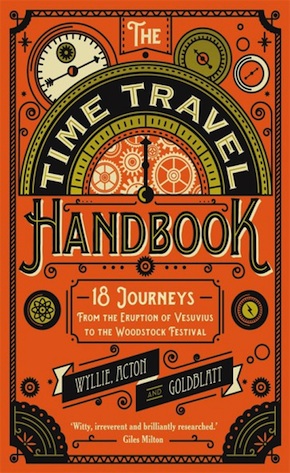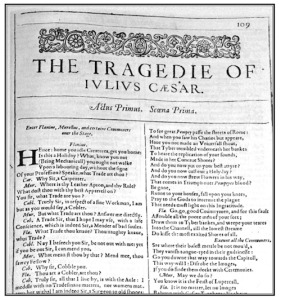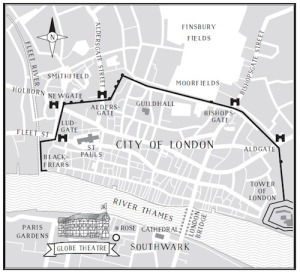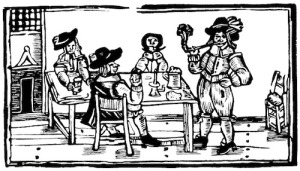Opening night at Shakespeare’s Globe
by James Wyllie, Johnny Acton & David Goldblatt
“Witty, irreverent and brilliantly researched.” Giles Milton
The Time Travel Handbook offers eighteen exceptional trips to the past, transporting you back to the greatest spectacles in history. You can join Henry VIII at the Field of the Cloth of Gold; march on Versailles with the revolutionary women of Paris; sail with Captain Cook to Tahiti and Australia; hang out at Xanadu with Marco Polo and Kubla Khan; accompany Charlie Parker at the birth of bebop or The Beatles in Hamburg; or take part in the VE Day celebrations in London or the Fall of the Berlin Wall.
Time travel agents Wyllie, Acton & Goldblatt chart the action as it will unfailingly unfold, advising on local customs, and what to wear, eat and drink, for the most authentic of experiences. Here is their itinerary around one of the most significant events in London theatre.
***
The reconstructed Globe Theatre on London’s South Bank gives contemporary audiences a flavour of what it might have been like to see the work of the world’s greatest playwright in its original setting. But why not see what it was actually like? On this trip our travellers will attend the very first play ever staged there – the premiere of Julius Caesar, on 12 June 1599. Amidst the electric atmosphere of an Elizabethan theatre, you will enjoy the excitement, thrills and spectacle of this historic moment, and hear some of the most quoted lines ever written uttered for the very first time.
This thirty-six-hour trip will also include a day’s sightseeing in London, allowing you to experience this great metropolis as it inspired and nurtured Shakespeare, the country boy with stars in his eyes.
Friday 11 June: The City
You will arrive at 9.30 am on Friday 11 June 1599 in the fields that straddle the fringes of urban Southwark. Bear due east for about a quarter of a mile and you will hit the main route to London Bridge. Jammed with traffic, human and animal, and lined with impressive buildings on either side, London Bridge offers visitors a spectacular introduction to the City of London. Immediately you step foot on it you will see two corn-grinding mills, then a drawbridge (no longer functioning) with a tower that sports the skulls of sixteen executed traitors and, midway across, a disused chapel.
Interspersed between these landmarks are large four-storey dwellings belonging to wealthy merchants, some with shops on the ground floor. The most grandiose of these is Nonsuch House, a Renaissance extravaganza, prefabricated in Holland and erected on site, with turrets, gilded columns and carved galleries projecting out over the river. As you approach the northern end you will be confronted with an arch containing a massive water wheel. Passing this you will now be close to Aldgate, the City’s front door.
Criss-crossed by broad thoroughfares and linked by narrow streets and twisting alleyways, The City is a hotchpotch of dwellings, from the slums of the dirt-poor to the mansions of the filthy rich, all rammed together alongside official buildings, trading houses, retail outlets and churches – many of them disused, There are many gardens and, always within walking distance, open green spaces, though many of these are occupied by laundresses drying their washing.
Male travellers should be on their guard against a ‘demander of glimmer’, an attractive woman who promises you her body, takes your money and runs.”
Wandering the streets, some paved or cobbled, others covered with gravel and beaten earth, you will notice how young everybody looks; half the population is under twenty. You will hear people being referred to as Goodman This or Goodwife That, and if somebody calls you snout fair, it means they think you are good looking. If, by contrast, they consider you as much worth as a piss in the Thames, take that as the insult it is clearly intended to be.
Be wary of courtesy men who prey on visitors, befriending then robbing them, while male travellers should be on their guard against a demander of glimmer, an attractive woman who promises you her body, takes your money and runs. You may also find yourself being accosted by tourist guides, ready to lead you a merry dance around town and relieve you of your cash. Don’t be suckered into accepting their help.
You will meet sellers crying their wares, flogging timely (fresh) fruit and pies from baskets, buskers, street performers and ballad sellers; at some point you will probably be handed a playbill advertising the grand opening of the Globe. Beggars will be hard to avoid – they are all licensed by church authorities to operate in a particular area for a specific period of time. You may also come across people being paraded around on carts (carting); these are minor offenders being publicly humiliated for their misdemeanours. Some may be tied to horses, but facing backwards. You will see individuals with either one ear or both ears missing: these are ex-cons who have been subject to a brutal punishment called pillioring.
The main meal of the day is at midday. We recommend you dine at either The Bull or The Green Dragon in Bishopsgate. The menu will not be as elaborate or extravagant as some of the more extreme examples of Elizabethan cuisine. Nevertheless, you will be able to choose dishes like Elus Bakyn, eels baked in red wine sauce; Pykes in Brasey, grilled fish in wine; or Salmon poached in beer, vinegar and herbs. The best beer to drink is March Beer. If you have an aversion to sweet varieties of wine, then avoid the ever-popular Sack, a dry, amber wine from Spain that has added sugar; Malmsey, from Crete; Muscatel, from France; and Rumney, from the Balkans. For lovers of a full-bodied red, there is Bastard from Burgundy or, for a lighter bouquet, Claret from Gascony. The premium white wines are from La Rochelle or the Rhineland. After the meal, you may want to order a shot of Flemish brandy (brandewijn).
Afternoon sports and The Tower
Eating done, you can plunge back into the hurly-burly of the city, or you might prefer something a bit more recreational. If you fancy a spot of sword play, we can book you a fencing lesson at Ely Place in Holborn. If pistol shooting is more your thing, then head to Artillery Yard, just to the east of Bishopsgate, an enclosed space with brick walls and targets at each end. Or, if archery appeals, make your way north out of the City to Finsbury Fields, where there are 200 butts (targets) available for experts and novices alike.
Fans of the gruesome and grotesque might take a guided tour of the Tower of London. However, do bear in mind that its dungeons and torture chambers are not just for show. Once inside, you will see The Pit, a twenty-foot-deep hole where prisoners rot in total darkness; the infamous Rack, where limbs are stretched and bones broken; and The Little Ease, a cave too small to stand upright in. You will also be introduced to a particularly fiendish contraption known as the Scavenger’s Daughter, a multifaceted instrument that comprises an iron band to compress the victim’s feet and head into a circle, iron gauntlets to crush their hands, and jetters (irons) to encase their arms and ankles.
You will be staying the night at The Bell Inn by St Paul’s Cathedral – the original Norman version of 1087. A light supper will be served at 6pm with a musical accompaniment provided by fiddlers, bagpipers and ballad singers. The atmosphere will be very smoky; you can add to the tobacco haze by purchasing a small-bowled pipe. Those with a competitive streak may fancy a game of chess or a crack at the bowling alee. There will also be gambling going on around you, whether on card games – gleek, primero, one and thirty, new cut and trumps – or dice, which are almost always loaded. Don’t get involved unless you are very skilled with a blade; disputes over money and honour can escalate rapidly into duels to the death.
Whatever you do, you must be off the streets by the 9pm curfew, which is signalled by the ringing of church bells. Watches, with powers of arrest, patrol the city to ensure that the taverns are shut, the shops shuttered and all good citizens are safely behind closed doors.
Saturday 12 June: Southwark
The City gates reopen at dawn. Breakfast will follow shortly after: a bottle of beer and buttered white or brown bread, each loaf sealed so the baker can be identified, the price and weight set by the Lord Mayor. After breakfast you will have a couple of hours to kill before having to be at Blackfriars to catch a wherry (water taxi) over to Southwark. You may want to take a look inside St Paul’s. Though famed for its beauty, the cathedral is now in a pretty sorry state, having suffered the depredations of the Reformation – its icons, tapestries, sculptures and gold ornaments have all been ripped out. Nevertheless, it retains the awesome architectural scale and majesty we associate with Gothic churches. If you are feeling energetic, why not climb its three hundred steps to the roof, from where you will get uninterrupted views of London.
Be prepared to fight for a good seat, as there are roughly 1,000 other playgoers who want one too… From the Pit there will be boos, hisses, shouts of encouragement and cheering and applause for memorable speeches.”
You may also want to browse the bookshops congregated round St Paul’s Churchyard, selling editions in ancient Greek, Latin, Italian, French and English; top of the bestseller list is Foxes Book of Martyrs (1563). Also popular are almanacs, saucy Italian verse and home-grown plays, including some of Shakespeare’s. (We regret that you may not make any purchases).
 Julius Caesar (not yet published)” width=”270″ height=”287″>
Julius Caesar (not yet published)” width=”270″ height=”287″>
The Globe
Southwark stretches south for a mile from the riverbank, and is heavily built up. Its squalid tenements are crammed together along packed streets and are home to watermen, craftsmen and foreigners, who rub shoulders with an underworld of criminals and prostitutes. Many of Southwark’s three hundred inns double as brothels, the most well-known being the Cardinal’s Hat. Mixed in with all the usual frightful odours is the unpleasant smell of the stink trades of brewing and tanning.
Your best bet for lunch is the Elephant Tavern on Horseshoe Alley, right next to the Globe and only a short walk from where your wherry docks. Don’t expect fine dining: this is Southwark, and you’re here for the theatre. To guarantee your place for the 3pm performance be there at least an hour early. As the Globe has a 3,300 capacity, the crowds gathering outside will swell considerably as you wait to go in.
There will be conjurors and jugglers dazzling you with their skills, sellers offering refreshments: oranges, apples, nuts, gingerbread and bottled beer, as well as pipes and pouches of tobacco at threepence a pop. Be on the alert for pickpockets and prostitutes on the prowl. The queuing arrangements will be more disorderly than orderly until you reach the gatherers who will take your money at the door.
Once inside the auditorium you will be impressed by the gilded decor, rich with classical motifs expressed in paintings, sculptures, tapestries and hangings. Here you will turn either left or right to enter one of the three galleries lined with wooden benches that surround the fifty-foot wide stage (2d admission).
Be prepared to fight for a good seat, as there are roughly 1,000 other playgoers who want one too. If you want to rough it, you could pay just a penny to enter the seatless Pit, an open yard that slopes towards the stage, covered with ash, slag and hazelnut shells, crammed with over 2,000 people from the lower sort – the understanders – jostling for a good view of the action.
Throughout the play, the audience will be fully engaged with the action. Cries of mew indicate displeasure. Expect the galleries to rise to their feet during the most intense scenes, while from the Pit there will be boos, hisses, shouts of encouragement and cheering and applause for memorable speeches. Though rowdy, the punters are generally attentive and appreciative; some even bring table-books with them to note down significant passages from the play.
Julius Caesar will last just over two hours, with no act breaks; the scenes, seventeen in all, will simply flow together to give the impression of continuous movement. Of the sixteen actors in the company – six of them boys who will take on the female roles – the leading man is Richard Burbage, the best of his day, and a pioneer of a more naturalistic approach to his craft. Generally, the style of acting will be what we would call hammy. This is partly to compensate for the fact that much of the audience will struggle to see the performers’ faces, while any dialogue spoken quietly will simply be lost in all the crowd noise. As a result, voices are big and declamatory, the verse projected with a booming rhetorical flourish. Gestures will be equally theatrical; the actors have a repertoire of fifty-nine hand gestures to communicate different emotions and states of mind. Though all the cast are adept at thribbling (improvisation), today they will stick to the script.
This is an edited extract from The Time Travel Handbook, published by Profile Books.
James Wyllie is an author and award-winning screenwriter. His most recent book is The Codebreakers – the story of the secret intelligence team that changed the course of the First World War. Johnny ‘Lord’ Acton has written books on everything from food (Preserved with Hugh Fearnley-Whittingstall) to the history of balloons (The Man Who Touched the Sky), and co-authored, with David Goldblatt, How to Watch the Olympics. David Goldblatt is the author of the definitive football histories The Ball is Round and The Game of Our Lives and writes and broadcasts on the politics of sport for the Guardian and BBC Radio. Read more.



